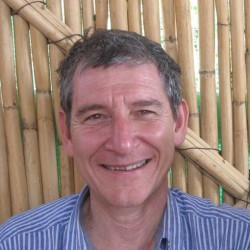Yacouba Sawadogo: The Man Who Stopped the Desert
September 25, 2013
Tonight I’ve had the pleasure of meeting Yacouba Sawadogo, though I’ve heard much about him in the past. I was already familiar with his work of restoring dry land using traditional farming techniques and the screening of the documentary about his story “The Man Who Stopped the Desert” inspired some reflections that I would like to share.
His perseverance and patience in the face of opposition. Most people give up when opposed. The pressure to conform is very great and it stifles innovation and change. Fortunately Yacouba did not cave in and he did not respond with anger, but reached out and eventually won over even his enemies who tried to destroy his work.
His courage in tackling a daunting task. The sheer scale of the land degradation was staggering: digging compost pits in concrete-like soil in 40 degree C. heat when he could have had a very comfortable life in his successful motorcycle business.
He took an existing technology and improved it. So much development effort and funding has gone into bringing ‘new’ and inappropriate technologies from overseas. Much of this effort has been a failure. There is a lot of wisdom in just sitting down with people and analysing what they are doing and why and then building on that. when I address audiences about land restoration their normal expectation is that I will be speaking about something very complex, very expensive and very long term with a high failure rate. Yacouba’s methods have demonstrated that the opposite is true. Very simple, low cost solutions can have very high impact relatively quickly.
I commend Yacouba’s open door policy and generous spirit. He did not have to share his knowledge or his seed with anyone, but he has done so freely and I think he is the richer for that – if not financially, then spiritually and in contentment. It is only in freely sharing in this way that grass roots movements can take hold and in time, transform not only whole villages, but districts, nations and regions. I met a man in Northern Ghana who had visited Yacouba. He was so inspired that he now says “I want to be the Sawadogo of Ghana”. So, with no external aid, no high tech communications strategies, no government support, Yacouba is inspiring a whole new generation of Sawadogos at home and abroad.

Tony Rinaudo is Natural Resources Advisor for the Food Security and Climate Change Team at World Vision Australia. Tony’s FMNR techniques have already been adopted by farmers in different parts of the world. He is currently attending the UNCCD 11th Conference of the Parties in Namibia
